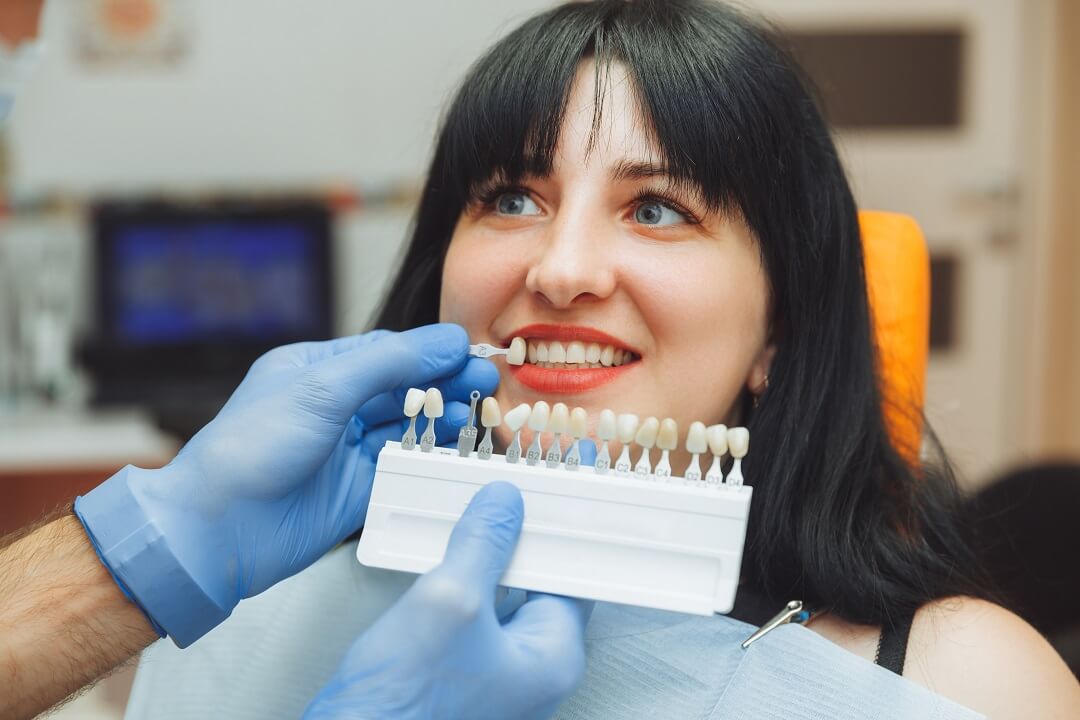If you hide your smile because of crooked teeth, tooth discoloration, uneven teeth, small gaps between teeth, or even small chips or cracks, chances are you may have considered veneers but may have questions when it comes to this procedure. At Soundview Family Dental, we are often asked “Do veneers ruin your teeth?” or “Are veneers bad for teeth?” While the answer to both questions is no, there are things you need to consider when getting and caring for dental veneers.
Key Takeaways
- Veneers are thin porcelain sheets bonded to the surface of natural teeth to improve appearance.
- Enamel is removed from teeth to prepare for veneers, but veneers provide similar protection once applied.
- Veneers can last up to 15 years and offer natural appearance, stain resistance, and color versatility, but can be expensive and may cause tooth sensitivity.
What are veneers?
Dental veneers are thin sheets of porcelain that are bonded directly to the surface of your natural teeth. They can be shaped and color-matched to achieve your desired smile. Veneers can be applied to a single tooth, multiple teeth, or even all your teeth if necessary. This cosmetic dentistry procedure is customized for every patient, helping to achieve the beautiful smile they have been hiding behind.
How do veneers work?
To receive dental veneers, your dentist first examines your teeth, looking for signs of dental decay or damage. Before you can get veneers, any potential decay must be treated first. Once your teeth are healthy, the dentist can prepare your teeth for the veneers. To do this, a thin layer of enamel must be removed from the teeth. While enamel is your tooth’s protective barrier, when bonded to the tooth, the veneer protects the tooth. Once prepared, special bonding cement is applied, and the veneer is bonded to the tooth.
How do veneers affect your teeth?
Once the veneer is bonded to the tooth, it acts similarly to your natural tooth enamel, helping to protect the tooth. However, just like with natural tooth enamel, bacteria can get under the veneers and infect the tooth, making regular dental hygiene and routine dental exams necessary.
Do veneers ruin your real teeth?
The application of dental veneers does require the removal of a thin layer of your tooth’s enamel. Once the veneer is bonded to the tooth, the veneer provides similar protection to the natural enamel. However, because the layer of enamel is removed, you must always keep the veneer in place. Given that veneers only last 10-15 years, you will need to replace the veneers over time and will need to follow a good oral hygiene routine.
How much of the natural tooth is removed during the procedure?
The amount of enamel removed for veneers is very minimal. In most cases, the dentist shaves off less than 0.5mm to allow the veneer to lay flat against the tooth and create a natural appearance.
Can you get cavities under veneers?
Unfortunately, it is still possible for decay to form underneath the veneer, similar to how a natural tooth can decay. Bacteria can enter the tooth from other areas or, if the veneer is not properly bonded to the tooth or becomes loose, it can enter the area directly under the veneer. Following a good oral hygiene routine, eating a diet low in sugar, and attending routine dental visits can help reduce your risk of cavities.
Pros and cons of veneers
As with any procedure, there are pros and cons to choosing dental veneers.
Pros
- Natural appearance: veneers offer a natural covering of the teeth that delivers a natural appearance and improvement to your smile.
- Stain-resistance: Because veneers are porcelain, they are resistant to staining, so no need to worry about your morning coffee causing discoloration.
- Long-lasting: Porcelain veneers can last up to 15 years or more before replacement may be necessary.
- Color versatility: If you are looking to apply veneers to all your teeth, they can be made in any color, meaning you can whiten your smile.
Cons
- High-cost: Porcelain veneers can be an expensive cosmetic dental solution, with each tooth veneer ranging from $1,000 to $1,500.
- Risk of damage: While porcelain veneers are tough and durable, the risk of breaking or chipping is possible. This risk increases when eating hard foods, as well as for those individuals that grind their teeth.
- Permanent: Because of the removal of tooth enamel, veneers are permanent. This means that, should a veneer need replacement, you can’t just opt to not have one reapplied without the risk of damage to your natural tooth.
- Tooth sensitivity: Because part of the enamel is removed, you have the risk of tooth sensitivity.
Veneers can deliver a beautiful smile
While dental veneers do change the structure of your natural tooth and require the replacement of additional veneers, when necessary, they do not cause direct damage to your natural tooth. In fact, in many cases, veneers not only help improve the appearance of your smile but help protect your tooth from damage when you follow a good oral hygiene routine.
Contact us
At Soundview Family Dental, we understand how important your smile is and our team of professionals works with you to achieve good oral health and a smile you can be proud to share. To learn how veneers may be beneficial for you, contact us today.


